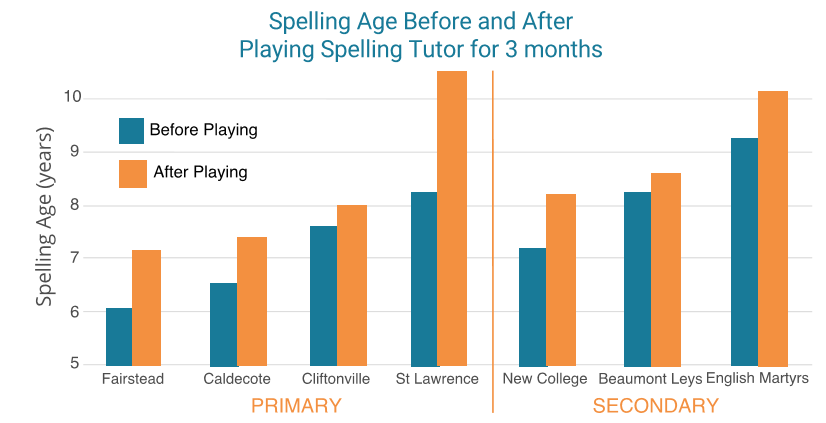The Impact of Using Literacy Gold Where Pupils are Behind in Spelling
53 pupils from 7 schools used Literacy Gold’s Spelling Tutor, as a personalised intervention. The study facilitated Literacy Gold to evaluate the program and monitor pupils' progress. The participating pupils were all identified by the schools' SENCo as having a spelling age at least 12 months below their chronological age.
After three months of using Spelling Tutor, children showed an average improvement of 10.5 months in their spelling age.

Implementation
Literacy Gold is an online spelling intervention for children aged 6 years and over. It provides personalised instruction, guided by inbuilt assessments, activity completion and the ongoing monitoring of progress. Spelling Tutor requires minimal support from teaching staff. Spaced repetition is used to ensure spellings transfer to the pupils’ long term memory.
SENCos were asked to identify pupils who were significantly behind in spelling. Pupils were eligible to participate in the trial if their spelling age was at least 12 months behind their chronological age. The selection criteria also included: children regularly attending school, not being in the early stages of English acquisition and having the ability to use a device independently for up to 20 minutes. Pupils who participated in the trial were between the ages of 4 and 14 years.
Throughout the trial period, pupils engaged with the programs independently, requiring minimal supervision from teaching staff. Teachers were instructed to ensure that pupils participated in the programs for 10 minutes each school day. On average, pupils completed 25 sessions on Spelling Tutor.
Prior to starting the trial, pupils were tested using the Vernon Spelling Test. The test was then given upon completion of the trial. The test measures spelling attainment and progress from age 5 to 18+ years.
Results
Pupils who participated in the trial made accelerated progress – an average of 10.5 months – over a period of 12 weeks. This is a gain of 3.5 months per month played. This demonstrates that through receiving personalised instruction, based on the pupils’ individual needs, pupils were able to progress at an appropriate pace and proceed swiftly in their learning of new spellings. Through spaced repetition, the pupils were consistently revisiting the spelling of previously taught words, enabling them to retain the spellings that had been taught previously. Pupils’ progress is evident in the results from the Vernon Spelling Test completed by each pupil upon completion of the trial.
Improvement in Spelling Age after Playing for 3 Months

Spelling Tutor is a low-cost intervention requiring minimal teaching support. Pupils enjoyed the interaction aspect of the intervention and the requirement to mark their own work.
Progress is linked to the number of times played and, as with all interventions, commitment is needed from the school to run the intervention on a daily basis. Pupils who played daily made the most progress.
Boys responded to the intervention slightly better than girls. It is suitable as an intervention for pupils with English as an additional language. On average, Spelling Age improved by 3.5 months for each month played. It is not suitable for pupils with severe SEND needs, such as those unable to work independently for 20 minutes at a computer. However, it is particularly suitable for pupils with dyslexia or auditory processing difficulties.
Spelling Tutor is effective for both primary and secondary aged pupils.
Once the intervention is complete, there is no requirement to repeat.
| Trial | |
| Average Spelling Improvement | 10.5 Months |
| Length of Intervention | 3 Months |
| Research Design | One group pre-test/post-test study |
| Age Range | Y4 - Y9 (8 - 14 year olds) |
| Inclusion Criteria | Pupils were all identified by their SENCO as having a spelling age of at least 12 months behind their chronological age |
| Result | On average pupils’ spelling age improved by 10.5 months over the 3-month period. The Ratio Gain shows Substantial Impact |
| No. of Pupils | 53 pupils from 7 schools |
| Test Used | Vernon Spelling Test |